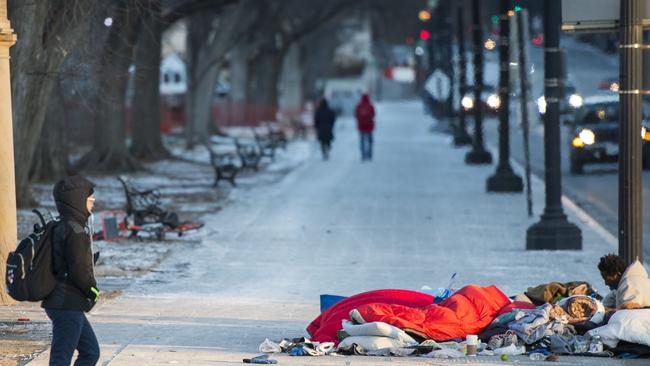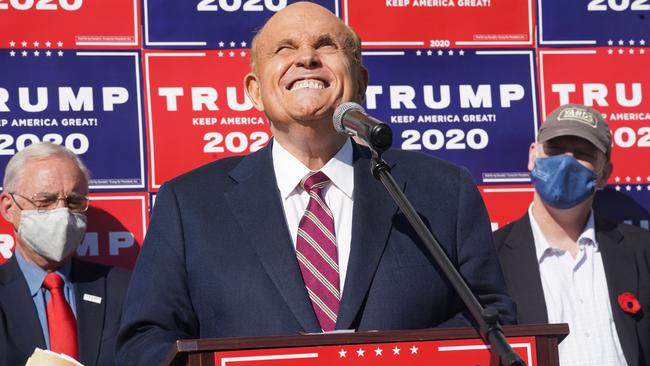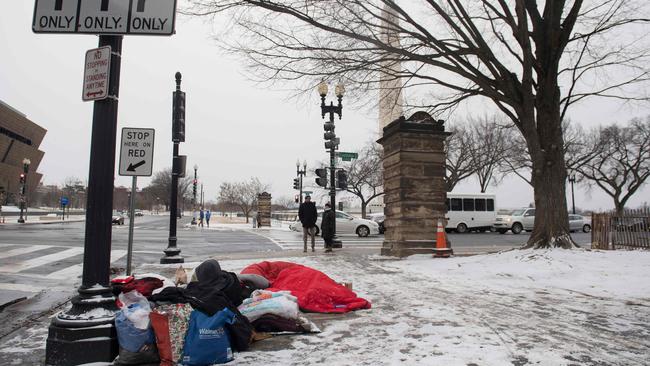COVID-19 shreds the safety net for Washington’s homeless
As the stricken elite enjoy the best medicine, the homeless risk infection in crowded shelters or freezing to death on the streets.

COVID-19 is consuming Washington. In Congress, the two parties are stuck in their customary gridlock, trillions of dollars apart on a coronavirus relief package. Across the city, Rudy Giuliani, legal counsel to Donald Trump, has been released from the plush Georgetown Medical Centre after receiving a hefty dose of Regeneron, the antibody treatment that revived the president after his own brush with the virus.
Yet from the L Street underpass, the pandemic looks very different. Just a few blocks from Congress, nestled between the luxury 110K Apartments building and the Wunder Garten beer hall, is the capital’s most established homeless encampment. Nowhere is America’s gaping wealth chasm more apparent than in these few downtown blocks.
For the white-collar tribe - the lawyers, lobbyists and bureaucrats who make the city one of the world’s richest - the pandemic is an almighty nuisance, keeping them out of the office and away from the theatre.

The virus has spread through nigh on the entire Trump administration, from the president and his family to a bevy of advisers, including both his election fraud legal representatives, Giuliani and Jenna Ellis.
But while the stricken denizens of Trumpworld receive the latest in cutting-edge medical treatment, Washington’s 7,000-strong, mostly African-American homeless population is faced with a far starker problem as winter deepens: head to the crowded shelters and risk illness, or stay out on the streets and risk freezing to death.
It is truly a tale of two cities. Food bank attendance is soaring, as is shoplifting. And as businesses shut and federal relief money dries up, more and more people are falling through America’s porous safety net. For Mama J, a longtime resident of the L Street underpass, to go anywhere near a shelter is unimaginable after so many years on the street. “I’m going to layer up and pray,” she said.
On Thursday afternoon, Mama J was sitting in her lawn chair and making Christmas cards to sell to passers-by. She has been living below the underpass since 2012 but has been homeless far longer than that. “I didn’t want to make a living as a whore or a thief,” she said. “So here I am.”
Mama J has no intention of taking a vaccine either, despite the fact that the Food and Drugs Administration has approved the Pfizer vaccine. “They just want to use the jab to control us,” she said. “I ain’t having no vaccine.”
America’s third wave is rampant, with well over 200,000 new cases and 3,000 deaths a day on average. In the past fortnight the country has had several of the deadliest days in its history, with more losses from the virus in 24 hours than there were on 9/11 or from the Japanese bombing of Pearl Harbor.
In the greater Washington area, the total number of cases has reached half a million. It was at 300,000 in mid-October. Queues at free testing centres stretch back several blocks during the afternoon, with anxious locals waiting hours to receive their swab.
The homeless have little to no protection. COVID-19 has spread rapidly through several shelters in the city and hundreds of homeless people have tested positive for the coronavirus. With residents packed close together, and all manner of pre-existing conditions widespread, the situation can deteriorate rapidly once the virus enters a shelter.

“There’s a lot of coughing going on here - a lot,” said Marcia Pearson, 51, who recently moved into the Adam’s Place shelter for women after four years on the street. “You just don’t know what someone is going to give you in the shelter. We know it’s contagious.”
With the temperature close to freezing at night, Pearson was confronted with the dilemma of whether to move into a shelter for the winter months. “Some folks wouldn’t come,” she said. “But a shelter is better than nowhere. There’s heat and a bed and meals, instead of sleeping on the concrete.”
Pearson is doubtful about receiving the vaccine, despite the fact that residents of homeless shelters will be among the first to qualify, such is their vulnerability. “I wouldn’t take the vaccine,” she said. “I guess that’s for people who have already got corona or are going to get it.”
Like many in Adam’s Place, Pearson is desperate to find employment. But the slow gears of poverty alleviation have jammed in the past nine months. “Nobody is really doing anything right now,” she said. “Housing, job, nothing. Hopefully, hopefully, hopefully we back on track in January.”
Even though the first vaccinations are being administered, America faces a long and deadly winter. The University of Washington’s coronavirus model estimates that half a million could have perished from the virus by April 1. The total has just passed 300,000.
However, an attendant epidemic in the world’s richest country is poverty. More than 20 million Americans are on unemployment benefit. About 54 million will struggle with hunger this year, according to the Department of Agriculture, up 45 per cent from last year. Relief funding has been snarled up because of the trench warfare of the Trump presidency.
“The full economic impact of this crisis hasn’t yet hit,” said Joseph Mettimano, president of the Central Union Mission, a shelter for the homeless in Washington. “We’ve seen at least a 50 per cent increase in the number of people coming for food assistance - invariably people who have recently lost their jobs. Folks got the stimulus cheques, but now what? We think that there will be an increase in homelessness to come next year.”
Like many shelters across the country, the mission shut its doors to newcomers when the pandemic hit in the spring, and existing residents were ordered to remain in place for months on end. Now though, with Christmas and deep winter approaching, it is carefully screening new visitors.
“We’ve shut our doors and obsessively kept the virus out,” Mettimano said. “But it’s not in our nature to turn people away over the winter months.”
Subsistence activities for the homeless, such as begging on the street, have also become difficult. “People are just walking past me every day,” said Wendell Worthington, who was asking for donations outside a Harris Teeter grocery store on Thursday. “People come down here and offer me a coronavirus test. I’d rather they gave me a job.”
Yet for many residents of the L Street underpass, the pitfalls of the pandemic are a distant concern compared with meeting more immediate demands. “These folks aren’t worried about nothing but finding their next meal and getting high,” said Mama J. “They don’t wear no masks or none of that. They want to be true to themselves. They want to get high. That’s what we do.”
@JoshGlancy
The Times







To join the conversation, please log in. Don't have an account? Register
Join the conversation, you are commenting as Logout